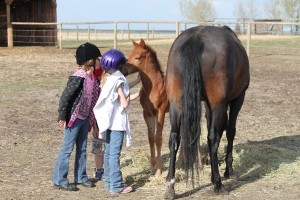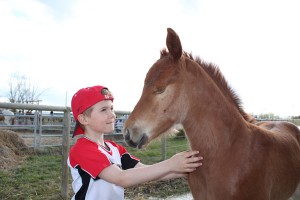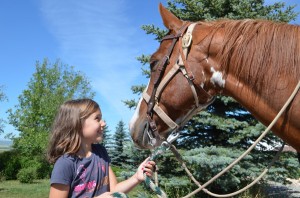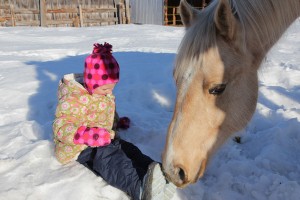Several years ago my neighbor, Chantele, called me. Her good friend, Denise, had recently lost her baby in the final days of her pregnancy. She was understandably distraught, and Chantele thought that a visit to my horses would be a therapeutic distraction. Little did she know, it would be an amazing experience for all of us.
The three of us were soon standing at the rail fence watching my horses. Chip, two months old at the time and always intrigued by visitors, bounded over to us. When he neared Denise though, his playful attitude evaporated. He slowly walked closer to her, and sniffed her.
Lowering his head, he nuzzled her.
The unspoken thought was in all of our minds: He knows you’re a mom.
She put her hand out and touched his neck. He closed his eyes. The communication between the two of them was instinctive. Electric. Emotional. There were no dry eyes.

Parallels
The human world has many parallels in the animal world. This is understandable, considering we are just another animal species. Parallels manifest themselves in many areas, but one obvious and understood by all is the relationship with infants.
Take, for example, a colt in a herd. He can kick, bite, jump on and basically be a pain to every other horse around him. He is exploring his world, and is permitted to do so. He is engaging behaviour patterns that, although entirely and instinctively horse, allow him to learn through a feedback process: what happens if I do this? Sounds like a human child, doesn’t it?
The herd understands on an instinctive level that the actions of a colt are non-aggressive. If he becomes too annoying, they let him know. But they don’t respond as they would to a rival. They understand he is not a competitor in the ultimate herd order; at least not yet.
Similarly, both colts and adult horses know the difference between human children and adults. It is a beautiful part of nature’s poetry. And one we can capitalize on.

In the Company of Children
My paint horse, Spud, finds his way into many of my articles. Spud is the most mentally active animal I have ever experienced. When I climb on his back, he is aware that it will be an exploration in learning for both of us. He is in a different mental state because he knows he will be put in a position to think through a decision. When he isn’t sure if his decision will be the right one, he worries. Through our training he is learning to trust his decisions, and learn that even if he acts counter to my expectations, that I will coach him on the right path and he will feel great at the end of our ride.
With Spud I must be exceptionally cognizant that all of my actions are positive reinforcement.
Conversely, when a child is on his back, he is immediately in a different mental place. He is happy and calm, with his head down and his eyes half closed. They can pull on his mane or play with his ears. He is totally fine with that.
Why?
It’s because Spud knows that he’s in the company of an infant. And just like a colt, he’s attuned to their innocence. Like a colt, a human child has no ultimate motive or intention – no goals. They are simply full of wonder, play and awe. Sometimes infatuation. As easily as a horse can sense nervousness in an adult, they can sense innocence in a child.

Spud is my first pick when taking a kid for a first ride. He’s the last horse I would put an adult on. My cousin, Deb, recently brought her daughters out to visit. I introduced them to all of my horses, then asked who they wanted to ride. Ashley picked Spud. I wasn’t surprised.
Capitalize on the Connection
Many of us have stories of children and horses. Sometimes those stories start with, I remember when I was a kid…and go on to relate some tale of a bareback bridle-less canter through the back pasture. We climbed on that horse because it felt right. We didn’t have an agenda for what to accomplish in the hour we allotted to be on his back; all we cared about was having fun with the horse. Do you think the horse knew that? Absolutely.
So as adults, where do we lose that innocence and intrinsic trust? Can we get it back? Can we make use of it? I believe we can.

Our adult lives seem forged in goals, motives and to-do lists. We need to have to have our horse ready for that competition on a specific date, no matter what. A pattern of schedule, competition, pressure and personal agenda. In this rush, we forget about the horses mind.
As adult humans, however, we have the ability to climb above instinctive emotions caused by pressure or fear. We have the ability to fall back on that child-like innocence. We can choose what emotions we feel. And we can use it to our advantage because a horse will sense it.
Spud has been my greatest teacher. If I focus on the mechanics of a physical maneuver I expect him to make, he becomes tense. However if I’m relaxed, smiling on the inside and enjoying the moment; if I’m not focussing solely on his response to my aids, but on our mutual goal as a single unit in the bigger picture, he picks up on that right away. To me, it feels like taking off the padlock and throwing away the chains. My understanding is that it feels the same way to him. My mental state creates a happy-place for him. In those moments we learn, accomplish and succeed.
Try this at Home
Saddle up your horse, climb on him in your pasture or paddock, and do nothing but enjoy the moment. Don’t ask anything of him. Enjoy him. Relax. Use all of your senses to feel him. If he moves off, let him. Just relax and feel what his body is doing. Get in tune with it. Smile a big smile. Think back to when you were a child, and give your horse a treat for a minute: be that kid. Fill your mind with innocence and fun; with awe and love and respect for that animal you are sitting on.
This is a very powerful state of mind. Capture it like a picture on your smartphone. File it so that you can use it again when you need to: Before a show when you’re nervous. When your horse is stressed because he is having trouble comprehending what you’re asking. When you’re frustrated.
Once you have achieved that mental state with your horse, then introduce the exercise by asking your horse to follow your body, not by driving him with your hands and feet.
Your horse might be wondering who this new awesome person is on his back. And you might be surprised at the results.
